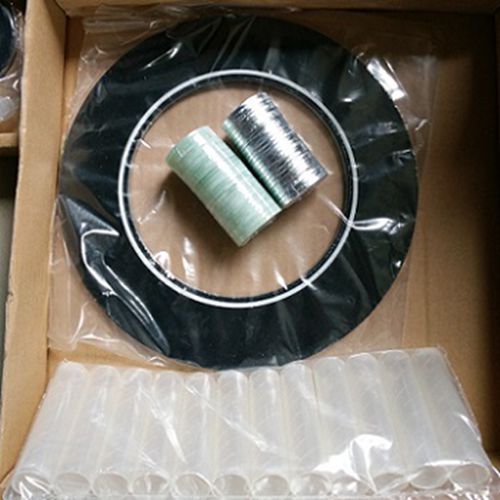
VCS Very Critical Service Flange Insulation Gasket Kit is a high reliability gasket used for both isolating and general sealing purposes in Very Critical Services. The gasket has a proven track record of integrity in aggressive sealing situations. The VCS is suitable in all services up to and including ANSI 2500# and API 10,000# classes. The VCS is designed for service where the cost of gasket failure cannot be tolerated. The VCS gasket consists of a PTFE (Teflon) spring-energized face seal, or an elastomeric o-ring, seated in an isolating laminate, which is permanently bonded to a high-strength stainless steel 316 metal gasket core.
Due to its unique pressure activated sealing mechanism, the gasket requires far less bolt stress to seal than any other gasket. The VCS gasket inner diameter is exactly matched to the flange bore to eliminate turbulent flow and flange face erosion/corrosion. The seal elements are replaceable in the reusable gasket retainer.

VCS Metallic Core:
The core of each gasket is made of annealed ss 316 stainless steel. Other metals, including Duplex and Inconel are available upon special order.
Gasket Isolating Material:
1) G-10
• NEMA grade G-10 Glass-Reinforced Epoxy
• Compressive Strength: 65,000 PSI
• Dielectric Strength: 750-800 VPM
• Max. Continuous Operating Temp: 302° F (150° C)
• Minimum Continuous Operating Temp: (minus) – 200º F
• Water Absorption: .05%
• Flexural Strength: 65,000 PSI
• Tensile Strength: 50,000 PSI
• Bond Strength: 2,600 lb.
• Shear Strength: 22,000 lb.
2) G-11
• NEMA grade G-11 Glass-Reinforced Epoxy (GRE)
• Compressive Strength: 50,000 PSI
• Dielectric Strength: 500 VPM
• Max. Continuous Operating Temp: 392° F (202° C)
• Minimum Continuous Operating Temp: (minus) -50 Fº
• Water Absorption: .085%
• Flexural Strength: 57,700 PSI
• Tensile Strength: 41,000 PSI
• Bond Strength: 2,200 lb.
• Shear Strength: 21,200 lb.
Seal Material:
• Teflon (Spring-Energized) Standard
• Nitrile
• Viton
Isolating Sleeve:
• GRE (G10/G11)
• NOMEX
• Mylar
Isolating Washers:
• G10, G11, HCS.
• 3mm thick washers
Steel Washer:
• ZPS standard Zinc-Plated Steel Washers
• SS Stainless Steel Washers
Advantages:
• Designed to withstand corrosive environments, including high concentrations of CO2, H2S, produced water and aggressive inhibitors.
• Pressure-activated seals provide high confidence sealing, eliminates costly leaks and provides a solution for fugitive emissions
• Works in Ring Joint Flanges, reducing fluid entrapment, flow induced erosion and media induced corrosion between flanges.
• Gasket is sized to the bore to protect flange faces from media-induced corrosion and flow-induced erosion.
• Sealing system is not sensitive to low bolt loads - providing reliable sealing through a range of bolt stress
• Withstands severe service conditions including vibration, temperature and pressure fluctuations.
• Extreme, high-reliability sealing and electrical isolation solution for critical service applications.
• Seals and isolates all pressure ratings through ANSI 2500 class and API 15,000 psi service.
• Available to match any flange specification (ANSI, ASME, API, MSS, BS, DIN, AS, others)
• Gasket is self-aligning and centering - quick to install and no special tools are required.
• Maintenance-free corrosion-resistant design is resistant to deforming under load.
• High-strength laminate material resists failure due to excess compression.
• Good electrical isolation properties for cathodic protection.
• Mitigates galvanic corrosion in dissimilar metal flanges.
• Can mate mismatched RTJ with raised-face flanges.
• Prevents turbulent flow at flanged connections.
• Easy installation, make up and removal
Application:
• Eliminate fluid trap corrosion between ring-joint (RTJ) flanges where high concentrations of CO2, H2S and other aggressive
hydrocarbon media are present.
• Mating mismatched ring-joint to raised-face flanges (VCS will seal in ring-joint, raised-face and flat face/slip-on flanges).
• Eliminate turbulence and flow-induced erosion between ring-joint (RTJ) flanges. .
• Isolation between dissimilar metals to prevent galvanic corrosion.
• Protect against coating impingement on coated flange faces. es
• Flange isolation in conjunction with cathodic protection.
• To seal between flanges subjected to vibration/cavitation
• Wellhead isolation from inter-connected flowlin
Suggested Flange Isolation Material Compatibility
